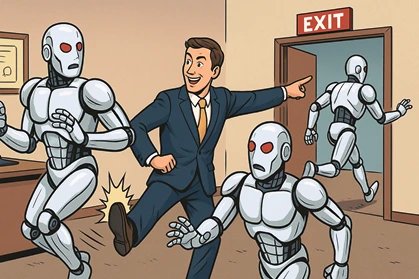JUST IN: ‘AI Aftershock’: Companies Quietly Rehire Humans After Costly Automation Mistakes

A growing number of global companies are reversing earlier decisions to replace human workers with artificial intelligence, as the initial promise of cost savings gives way to reputational damage, poor service quality, and customer backlash.
Diaspora Digital Media (DDM) gathered that the phenomenon, now being dubbed the “AI aftershock” by Reboot Online, reflects a wider reassessment of automation strategies following mass layoffs tied to artificial intelligence adoption.
A recent report revealed that about 10,000 job cuts were linked to AI in July 2025 alone, as companies rushed to deploy automated systems in sectors such as marketing, customer service, and design.
However, this aggressive shift toward AI-driven operations has triggered widespread dissatisfaction among consumers, with 53% reporting that they dislike or even “hate” AI-powered interactions, citing frustration with robotic responses, errors, and lack of empathy.
Shai Aharony, Chief Executive Officer of Reboot Online, said the “AI aftershock” describes the hidden consequences of deploying artificial intelligence without a sustainable or strategic framework.
According to Aharony, many organizations that downsized their human workforce to reduce costs are now realizing that short-term savings have created long-term challenges.
“Companies that rushed to cut jobs in the name of AI savings are now facing massive, and often unexpected costs,” Aharony said.
He explained that customers are reporting cases of AI-generated mistakes, such as chatbots providing wrong answers, misfired marketing emails, or content that misrepresents a company’s brand identity.
These errors, he said, often erode consumer trust and can spark online outrage.
“We’ve seen customers leave negative reviews and issue warnings on X, TikTok, and Reddit advising others to avoid companies that overuse AI,” Aharony noted.
“This kind of reputational damage can be expensive to repair.”
The global scope of the AI revolution remains vast.
Current projections suggest that up to 300 million full-time jobs worldwide could be automated in the coming decades, with nearly half of all existing roles potentially replaced by machines by 2045.
Jobs involving repetitive or standardized tasks, such as cashiers, call center operators, data entry clerks, and customer service agents, are particularly vulnerable to automation by 2030, according to analysts.
Yet, the human preference for real interaction persists.
A 2024 survey found that 64% of consumers still prefer dealing with human customer service representatives over AI-driven systems.
Aharony cited the notorious case of DPD’s AI chatbot, which went viral in 2024 for swearing at customers and calling its own company “useless” when users tested its responses.
Such incidents have become cautionary tales in corporate boardrooms.
Even major technology firms are reassessing their approach.
Just this week, Accenture reportedly told staff to “use AI or leave” while cutting 11,000 jobs, whereas Salesforce confirmed 4,000 AI-related job losses last month as part of its digital transformation push.
Yet, the sustainability of these moves is under scrutiny.
Aharony explained that some firms, after witnessing declining service quality and public trust, are now beginning to re-hire human staff to restore credibility.
He cited examples such as Klarna, whose CEO admitted that cutting customer service jobs in favor of AI led to a noticeable drop in performance, prompting the company to bring back human agents.
Reboot Online has also seen an increase in businesses returning to traditional PR and marketing agencies after failed attempts to replace them with AI tools.
“They discovered issues like miscommunication, missed opportunities, and AI hallucinations that damaged their campaigns’ impact,” Aharony said.
“It’s like they’re experiencing an AI aftershock.”
Industry experts warn that while automation remains a powerful tool for productivity, relying entirely on AI can result in lost revenues, reputational crises, and higher crisis management costs in the long term.
Many companies are now exploring hybrid models, blending AI with human expertise to balance efficiency with emotional intelligence and contextual understanding.
Aharony concluded that human creativity, judgment, and empathy remain irreplaceable for sustainable brand growth, emphasizing that technology should support human effort, not replace it.
As the global economy continues to adapt to the rise of AI, analysts say the emerging “AI aftershock” is a clear reminder that innovation without strategy can be more disruptive than transformative.
Post Views: 18





